The Tabungaw Hat Maker of San Quintin
Teofilo Garcia – A Philippine National Living Treasure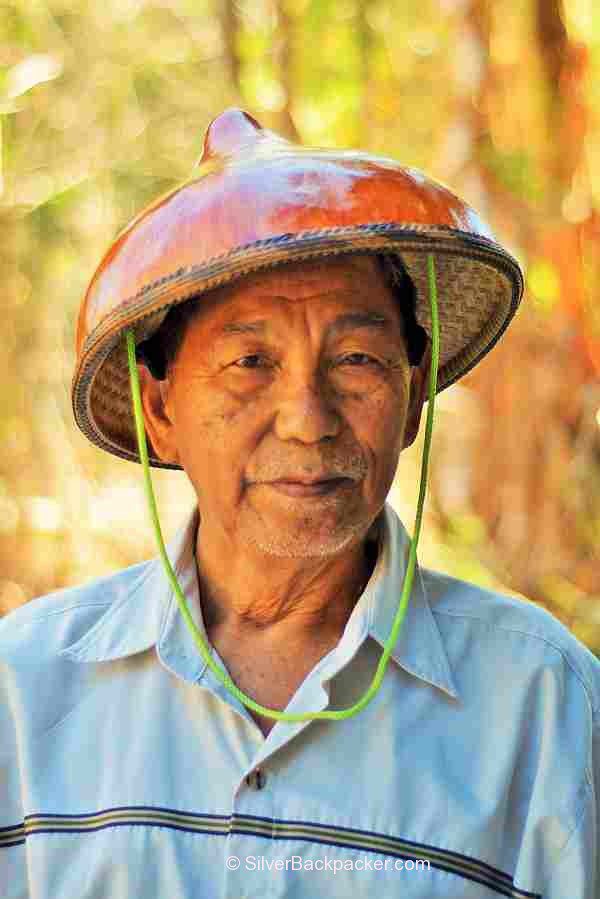
Teofilo Garcia
- Born 27th March 1941 to Francisco Garcia and Concepcion Callos from San Quintin, Abra.
- He attended Villa Mercedes Elementary School (formerly known as Barbarit Elementary School) until 4th grade
- At the age of 15 he learned the art of Kattukong or Tabungaw hat making from his grandfather Hipolito.
- He married Dolores Cabael from Narvacan, Ilocos Sur
- They have five children Ferdinand, Redentor, George, Jocelyn and Carol
National Living Treasure Awardee, 2012 (Gawad sa Manlilikha ng Bayan)
Keep your eyes open while walking around Bangued and you may be lucky enough to spot Teofilo Garcia on one of his weekly shopping trips to town. He will be very easy to recognise as he will be wearing his Unique Tabungaw hat, which he wears each time he leaves home.
Teofilo Garcia is a simple man, still a farmer at heart and since he was bestowed the title of “Gawad sa Manlilikha ng Bayan” ( National Living Treasure) he has been invited to give talks and demonstrations in the Philippines and abroad, teach local school children the art of Tabungaw making, and open up his home/workshop to drop in visitors who wish to meet him and buy one of his unique products.
The Art of Tabungaw Hat Making
The hat called a Kattukong is weatherproof and made from Upo (tagalog) or Tabungaw (Ilocano), also known as Bottle Gourd or White Pumpkin which are part of the Cucurbitaceae family of plants.
Each December the seeds are planted and three to four months later in March the crop is harvested and brought down to his workshop to be cured and dried. The gourds are cut open using a hand saw and the two halves placed on the ground by his house. They are left there for about a month while nature takes over. Ants are attracted to the rotting pulp and help to clean the insides leaving the case empty.
It is then finished by hand and left to dry completely.
Only the upper half is used to make the Tabungaw. The bottom half can be used around the house for various storage purposes.
After drying, the Tabungaw is then coloured and varnished. Any blemishes in the gourd are left in place and not hidden, adding to its attractive look.
The most time consuming and skillful part comes next. That is the weaving of the bamboo inner casing and lining.The woven interior is made of anahaw, nipa, bamboo, and/or rattan.
Only around one hundred Kattukong are made each year with each Tabungaw taking on average 7 days to transform into a hat which will last a lifetime if taken care of properly.
Locally the hat is also known as “Strongkis”

Teofilo learnt the necessary skills from his Grandfather at the age of 15 after they moved from their isolated home up in the hills to the present location. The family was forced to move due to rebel insurgency which was rife at the time.
Nearly everyone wore a Tabungaw in those days. When one broke or was damaged it would be instantly replaced. Most families knew how to make them. But slowly over the years as imported goods became cheaper, people started to wear baseball caps and other kind of hats causing the Tabungaw industry to decline. Now, Teofilo Garcia is the last of the Tabungaw hat makers.
The Gawad sa Manlilikha ng Bayan or the National Living Treasures Award gives recognition to Filipino traditional craftsmen or artisans whose skills have reached a high level of technical and artistic excellence and who are tasked to pass on to the present generation knowledge threatened with extinction.
To fulfil his pledge, Teofilo has extended his knowledge to local school children who attend his workshops. Since 2014 the students of San Quintin National High School have been making their own Tabungaw Graduation Hats.
Unfortunately, after graduation none of the students are interested in continuing their studies with Teofilo, and becoming an apprentice which leaves the skills of Tabungaw making in danger of becoming extinct.
Photo Credit – San Quintin National High School – photo credit Jerome Punzal

Video
Watch the video to see how Teofilo cuts the Upo in readiness for drying and curing
Hat Collectors and Investors
The Tabungaw hats made by Teofilo Garcia are now becoming collectors items and are being bought by hat collectors and investors, not only in the Philippines but worldwide.
A Hat Museum is taking one of Teofilo Garcia’s Hats on a tour of the USA in 2020.
Video
Watch the video to see how Teofilo cuts the Upo in readiness for drying and curing
Tabungaw Hat Found in a Florida Flea Market
What a wonderful story from Robert Barber in the USA
“Last year my two sisters and I visited the Florida’s panhandle we stopped at several thrift shops cause I like to browse around . So I seen this hat from a distance in a store , as I got closer I said that looks different I thought it was acorn or something so I asked my sisters how does it look they said it looks ridiculous she said if she doesn’t get it for me I’m going to be talking about I should have bought it .
Well once I put it on I kept it on walking into hotels there etc. I’m in New York City now I did my research before I left Florida . I get good comments all the time .
Thank you Teofilo Garcia . It wasn’t varnished when I bought it that part I don’t understand. I just varnished it and it stands out beautifully ! “

An Ilocano woman and a man wearing a katukong and annangá, ( a cape made from nipa leaves) circa 1820s.

The 2012 GAMABA Awardees: Magdalena Gamayo and Teofilo Garcia.
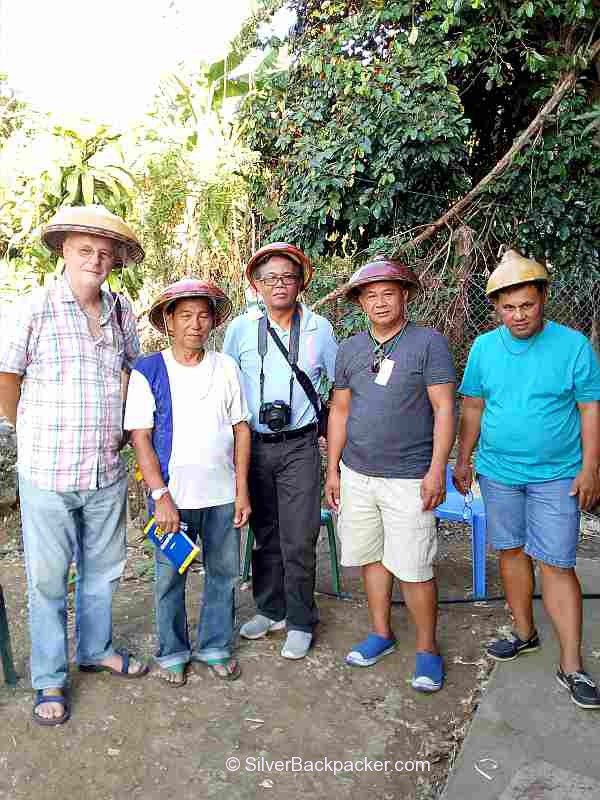
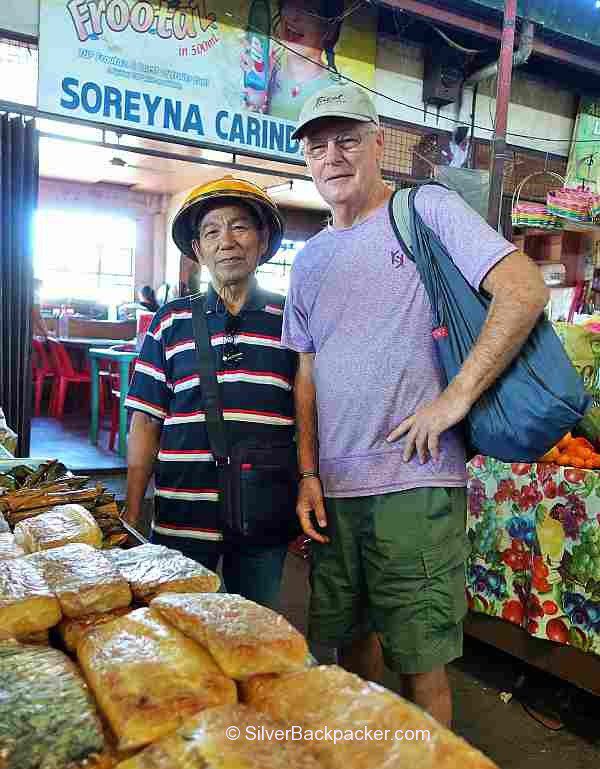
To visit Teofilo Garcia
You can contact Abramazing Tours to arrange a visit to Teofilo Garcia’s workshop in San Quintin.
Read More about Teofilo Garcia
National Commission for Culture and the Arts
The Gourd – Tabungaw or Upo


Essential Travel Guides
Teofilo Garcia
The Tabungaw Hat Maker
of San Quintin
Related Posts you may like to read
Know Your North Season 7 Episode 4 Teofilo Garcia
PIN to Read Later
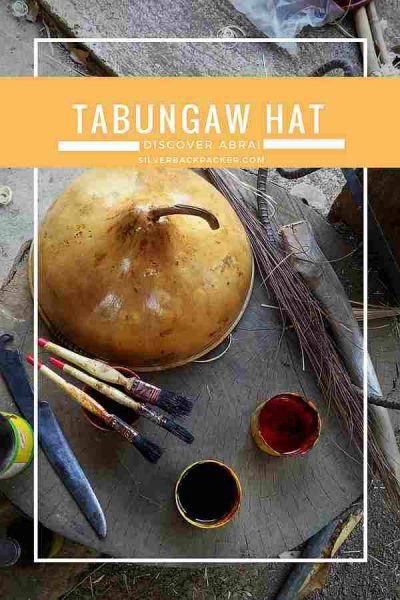
Did you like “The Tabungaw Hat Maker of San Quintin ” ? If so then please share this page with your friends.
Leave a comment below to let me know what you liked best.
Follow Silverbackpacker on Facebook, Instagram ,Twitter and Pinterest for more travel adventures and be notified about my latest posts and updates!
Thankyou for sharing 🙂
PIN to Read Later

All photographs and content on this website remain the property of Silverbackpacker.com. Images may not be downloaded, copied, reproduced or used in any way without prior written consent.
Print purchases entitle the purchaser to the ownership of the image but not to the copyrights of the image which still remain with Silverbackpacker.com even after purchase.
Follow Silverbackpacker for more of his Travels
Facebook @silverbackpacker | Instagram @silverbackpacker
Twitter @silverbackpaker | Pinterest @silverbackpaker
Audere Est Facere – Silverbackpacker.com – To Dare is To Do
Affiliate Disclaimer: Links on this website may be affiliate links that could result in us receiving compensation when you purchase a product or service from that link. You do not pay any extra fees for these items. This helps us to keep this website going. Thank you for your support.
Disclaimer | Privacy Policy | All Rights Reserved

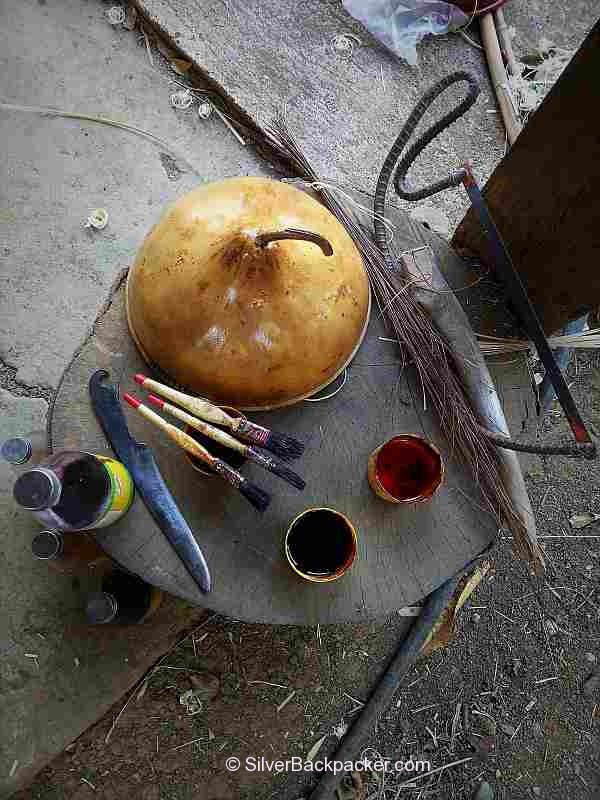


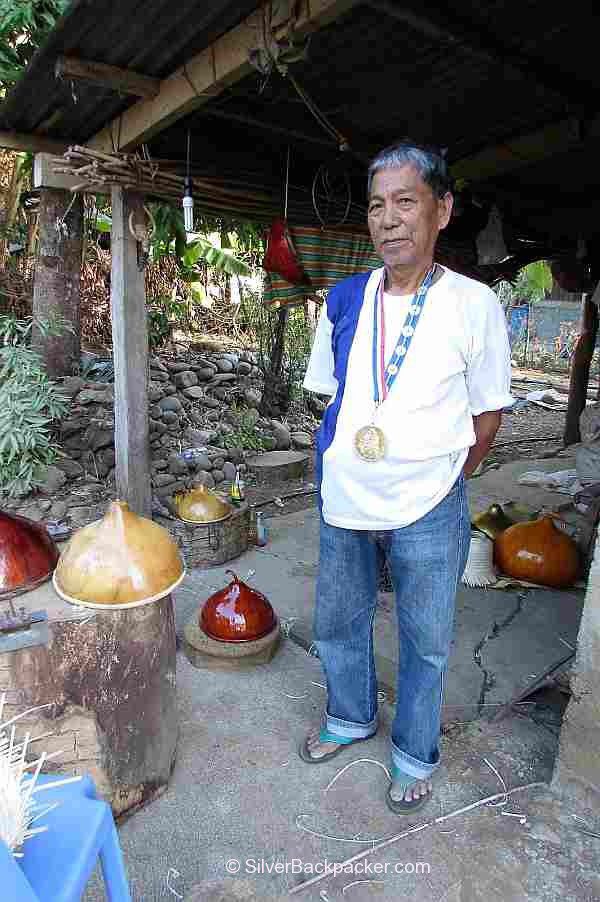
Trackbacks/Pingbacks